Ghost's Nameless Ghouls talk new album Meliora
A candid conversation with guitarists Fire and Aether

Introduction
They’ve headlined Brixton and count Metallica’s James Hetfield among their ever-growing army of fans, but refuse to reveal their identities. We delve deep inside the secrets to Ghost’s sound and success.
"Their rise to glory has been unearthly to say the least"
They often say looks can be deceiving, and in the case of Swedish occult rockers Ghost, they couldn’t be more right. On paper, you’d be forgiven for thinking that Papa Emeritus III and his five Nameless Ghouls play the kind of outlaw black metal that soundtracked many a Norwegian church-burning in the 90s.
But influences that span as far and wide as Blue Öyster Cult, The Beatles and ABBA made for spine-tingling serenades that quickly won them friends in high places, including Metallica’s very own James Hetfield and Dave Grohl.
Their rise to glory has been unearthly to say the least, from their UK debut at Camden’s 500-capacity Underworld venue in 2010 to headlining Brixton Academy just three years later. They’ve certainly worked hard for it, but you can’t help get the feeling there may even be other forces at play.
As the sinister ministers prepare to unveil album number three, Meliora, their two gunslingers – or rather, Nameless Ghouls Fire and Aether – offer Total Guitar their most revealing and candid interview to date...
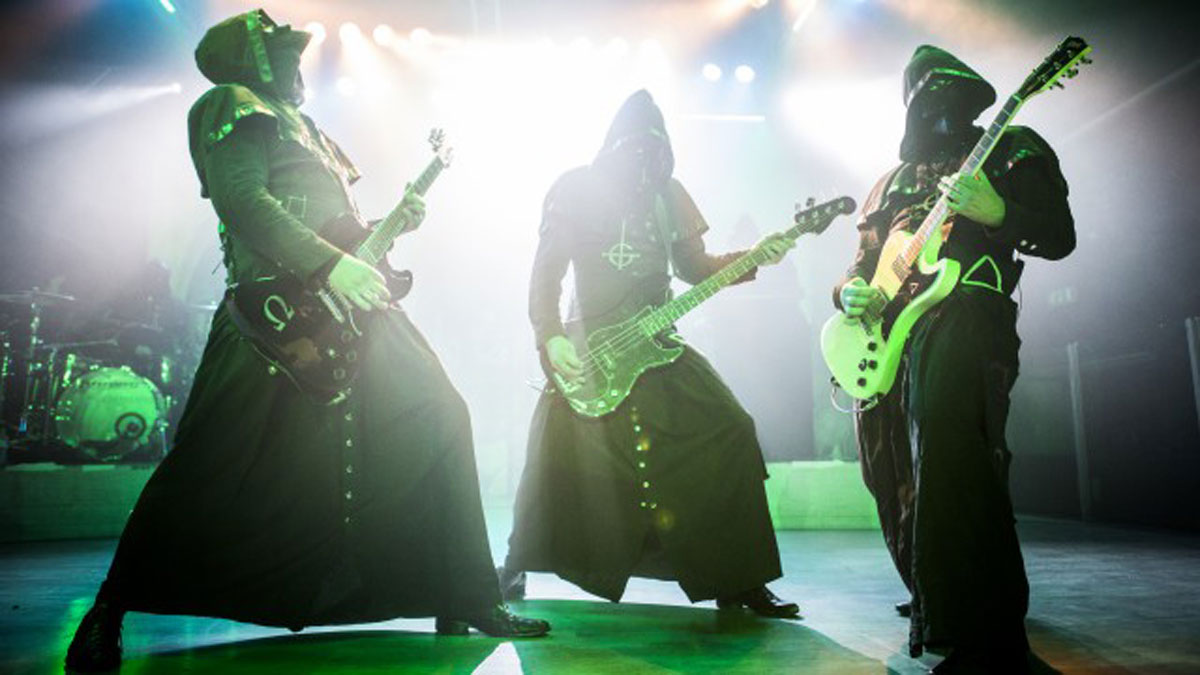
Getting better
We read that Meliora is Latin for ‘better’. Is that a fair assessment of how you feel about your new album?
Fire: “I believe the actual translation of the word is: ‘in pursuit of something better’. So it’s more about the road towards something better. And I feel that any band that didn’t have a similar thought going into a new record is just wasting everybody’s time.
"The new masks are harder to perform with than our older ones" - Aether
Of course, we want to outdo everything we’ve done in the past. The title ties in with the album lyrically - the thematics and social commentary - rather than trying to say this our best record. Though we naturally feel like that!”
Aether: “This is something that grew because we’ve grown as people, too. Maybe five years ago we wouldn’t have liked these songs! This style of writing only came out over the past year, almost because of the other stuff. Of course, what we like most is what we’re working on now.”
The Ghost live performance is a theatrical experience. What are the main challenges in conducting your live rituals with masks on?
Aether: “It really comes down to the individual. The new masks are harder to perform with than our older ones, which were very lightweight. But you soon get used to it and it makes it easier to let go on stage. I never have to worry about how I might look in a photo, if I was fickle or vain enough to care. Even if I’m really fucking hungover, no-one will ever see it.
"As soon as you put the mask on, there’s that Darth Vader moment - ‘Csssshhh’ - and you’re on your own!" - Fire
“But that’s not the main perk... I love it because it’s a uniform for the band that makes us feel connected, like a unit. The downside is it gets very hot and changes how we communicate. You become very skilled in reading people’s body language. If a guy walks a certain way, he probably needs to retune his guitar so I better fill in on the next part, stuff like that. We’re all reliant on each other and after a while it feels like we’re one organism that can’t quite see or hear each other. After a while, you know your positions - there’s an element of choreography, I guess.”
Fire: “It’s a lonely place. As soon as you put the mask on, there’s that Darth Vader moment - ‘Csssshhh’ - and you’re on your own! That’s the end of communication for one-and-a-half hours. It gives no facial expression. Instead, there’s nothing, just blankness. It’s not happy or sad. People don’t even know where you’re looking; you’re a black hole to them. When we look out, we can see a lot of faces. Sometimes I think, ‘Why are they looking at me like that?’ and then realise, ‘Oh yeah, it’s because we look like nutters!’”
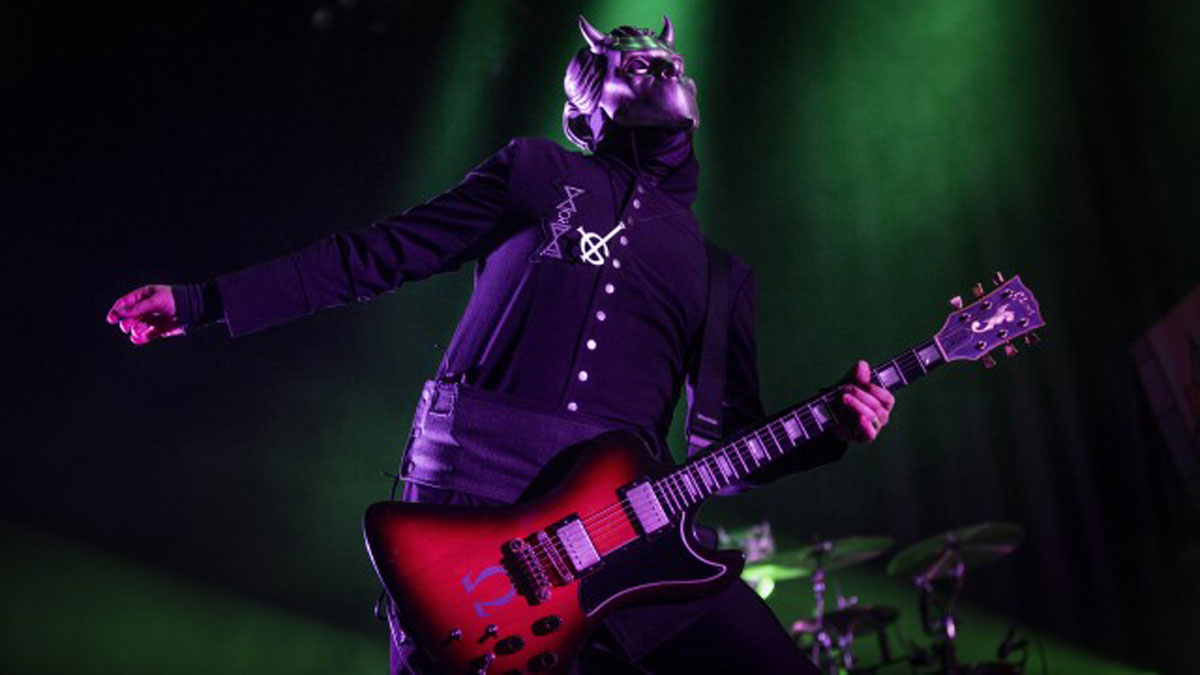
RD ha has
You’re mainly known for playing Gibson RDs, which are notoriously difficult to find. What attracted you to such an unusual model of guitar?
Fire: “The guitars we play are so rare that today in London [Ghost flew over for this interview], we could not find any. Not even one! The irony isn’t lost on us. We wanted a guitar that would brand ourselves differently. As much as we’re embracing the past... we wanted to be synonymous with something different.”
"I saw a Gibson RD for the first time about 15 years ago and thought it was the coolest guitar I’d ever seen" - Aether
Aether: “I saw a Gibson RD for the first time about 15 years ago and thought it was the coolest guitar I’d ever seen. When we started Ghost, I was using a white SG and it just so happened that Gibson had recently reissued a series of RDs.
“We established contact with Gibson and asked for two black and two white ones, saying we wanted to brand them as our guitar. Not many people had stuck with them. Sure, [U2 bassist] Adam Clayton played them for a while, [Nirvana bassist] Krist Novoselic had one, even Dave Grohl owns some...”
Speaking of Dave Grohl, what was he like to work with when he produced your If You Have Ghost EP in 2013?
Aether: “We went to his Studio 606, and he actually had a bunch of RDs there. Of course, I asked if I could try them out and he was like, ‘Try anything you want!’ And he meant it, too. So I found this 1979 RD and used it to record the EP. The Moog chip had been removed [early RDs were built with active circuitry including a switchable ‘bright’ mode] because while that was cool in ’79, you don’t really want local radio stations coming out of your speakers.
“It was a very cool-looking guitar that sounded like a cross between a Gibson Les Paul, Explorer and, to some extent, an SG. RDs have that Gibson sound and I guess we’re a Gibson band!”
Fire: “I must add that we use custom pickups made in Sweden by a guy called Lundgren. He works with many Swedish artists [such as Meshuggah]. They’re all handmade and play a big part in our sound. He just sits at home by his kitchen table, hand-wiring pickups... and they sound killer! I’d already bought one set, but then he contacted the band about working together and has been amazing to us.”
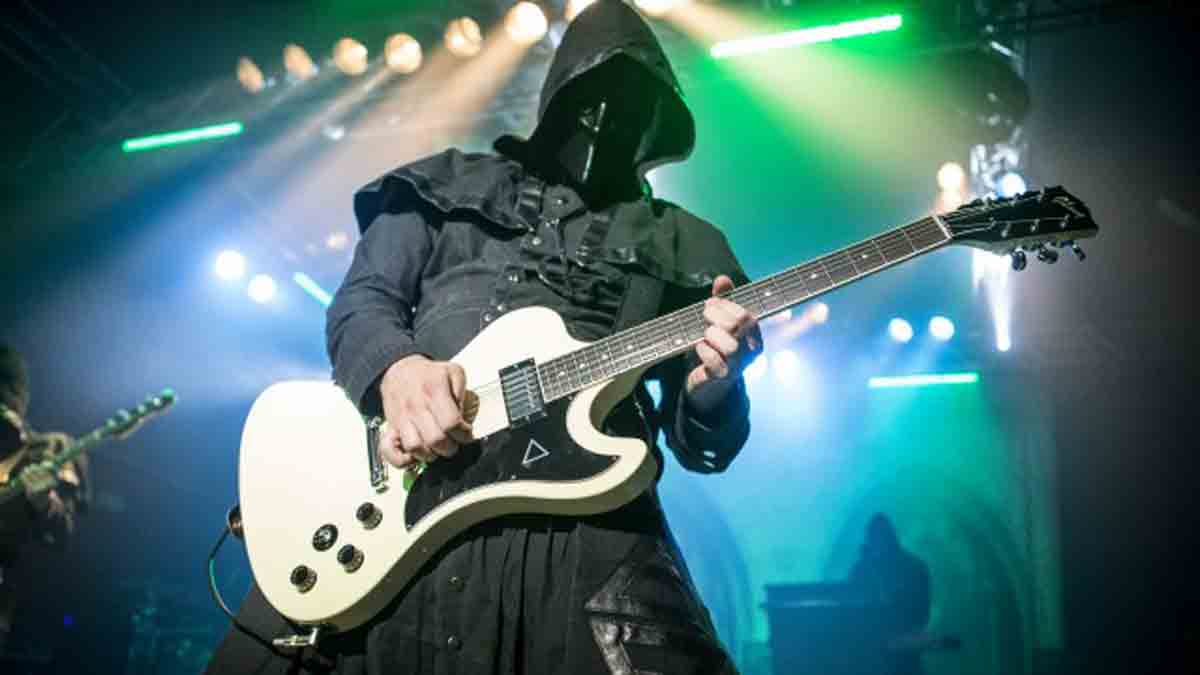
Tonal commandments
As for amps, we’ve only ever seen Orange stacks on your stages. Which models are you using live and in recording?
Fire: “We mainly use Rockerverbs, but it’s also important to say that from a recording and rehearsing point of view, we use different things. The mixture of Orange amps with a Gibson SG was the formula for the first record and is what we’ve built our sound on. But nowadays we’re mixing several Orange amps and several other ones to create that wall of sound.
"Back in the old day, bands didn’t have any commandments to follow, they just wanted to sound good" - Aether
“Each guitar part is recorded using three different amps. Just think, in the old days, Pete Townshend from The Who would get all the latest gear from Hiwatt, Marshall, all the brands... say thanks and then go smash them up! Nowadays, I find bands that sound retrospective do it so firmly, it destroys their ability to actually evolve the music.”
So, what is the secret to nailing a convincing vintage guitar tone?
Aether: “There are so many rules for what is vintage and what is not. Pay respects to your heroes but don’t be afraid to alter it for yourself. If you live by rules like: ‘We have to sound like Sabbath,’ well... let’s just say even Black Sabbath didn’t want to sound like Black Sabbath after a while!
“We’re all here to evolve. Back in the old day, bands didn’t have any commandments to follow, they just wanted to sound good. We like the sound of the old albums, they’re not overly distorted or cranked.
“Our newest album is the closest we’ve come to cultivating our own guitar sound. It took days and days of A/B shooting. We’ve never had that much time to really dial in the tone.”

Keys to their success
Being in a band with two guitarists, how much awareness is there of leaving space for the keys?
Fire: “From a songwriting point of view, it’s imperative to understand all the components you have within the sonic landscape. That definitely comes into the development of the song. A lot of people think the solo on Mummy Dust off our new album is a guitar. It’s actually a keytar solo!
"We want to experiment with songwriting rather than mess around with effects" - Aether
“We met our keyboard player about 10 years ago. He was playing with this other band and started shredding on a keytar. He was kickass, like Hendrix levels of ‘wow’. So when we made this record it felt like it was time to release the hounds!
“We’ve been talking about this for years... We have this great trick up our sleeves - he’s so good at keytar, we’re thinking about making a futuristic album. It’ll happen sooner or later, and we’re almost saving his full potential for then...”
Aether: “Because keytars are like a forbidden thing! You’ll definitely be tormented with more synth moments at some point in the future. And he plays it with a wah-wah! You have to see it to grasp how cool it is, the ability to play that fast and shred...
“You know, for us, everything has to come into consideration. We use Moogs and early synthesizers for the late 70s early, 80s sounds. Then we balance it with drums, bass, two guitars and vocals. We want to experiment with songwriting rather than mess around with effects. We use maybe a little, just a few choice spices... But mainly we work with the tools at hand and make the best out of it.”
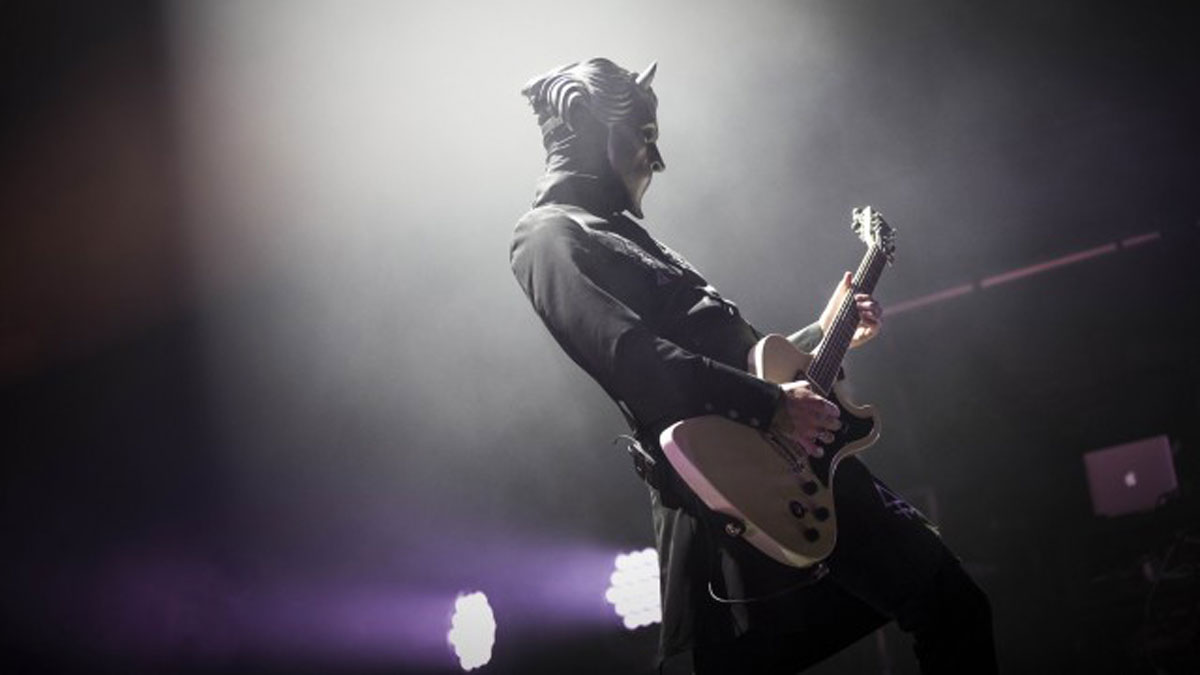
Prog-rock detours
And as for your own musical backgrounds, are you classically trained or going more for old-school feel?
Aether: “Neither of us really studied music; it’s just about what feels right for the band. I’m very interested in film music and soundtracks. There are schools that teach you how to build suspense and drama. Until we learn more, it’s down to our ears. That’s where ABBA comes into play. They fill every gap of space with something that’s called for.”
"It’s closer to classical or prog than standard rock" - Fire
Fire: “I’ve always been into classical music. Even though I’m not classically trained and would struggle to tell you what chord I’m playing. Especially as we tune down, we always have to tell our keyboard player, ‘Transpose to us, motherfucker!’ A lot of unconventional language for us comes from being influenced by classical minor music.
“Speaking about the future, even though we make rock records, I’m curious to see if we can explore actual dramatic music. Not relying on drums or 4/4 beats, but rather orchestrating pieces like a musical! I think we have achieved an element of that - there are choruses in five bars rather than four, which make sense with vocals... that’s a typical classical thing. It’s closer to classical or prog than standard rock.”
The new album has its fair share of prog-rock sounding detours. Can you tell us more about your non-metal influences?
"An ABBA song... it’s like the end of the world! A lot of it is very sad and melancholic" - Aether
Fire: “We have good friends like Opeth, who are definitely a lot more proggy than us. Those guys are like outspoken keepers of the prog tradition. Next to them, we’re more of a shock-rock band! But we are inspired by many progressive artists.
“Plus the origins of Ghost actually came from the first two Pink Floyd albums. Back when I was learning guitar, they were the band that showed me it’s okay to have over five choruses. It’s only when I started jamming with other people I was told, ‘Dude, that’s pretty weird!’ So we combine metal with a lot 60s and 70s unconventional music. ABBA are complicated and very progressive in ways!”
Aether: “Sometimes, I listen to a heavy-metal band and think: if you made a symphony orchestra play those songs, they might not sound that malicious. But take an ABBA song... it’s like the end of the world! A lot of it is very sad and melancholic. Their version of I’m A Marionette is way scarier than our cover... it’s got this haunting violence to it. And growing up in Sweden, you just couldn’t avoid them. Their music was everywhere and that almost set our standard for melody.”
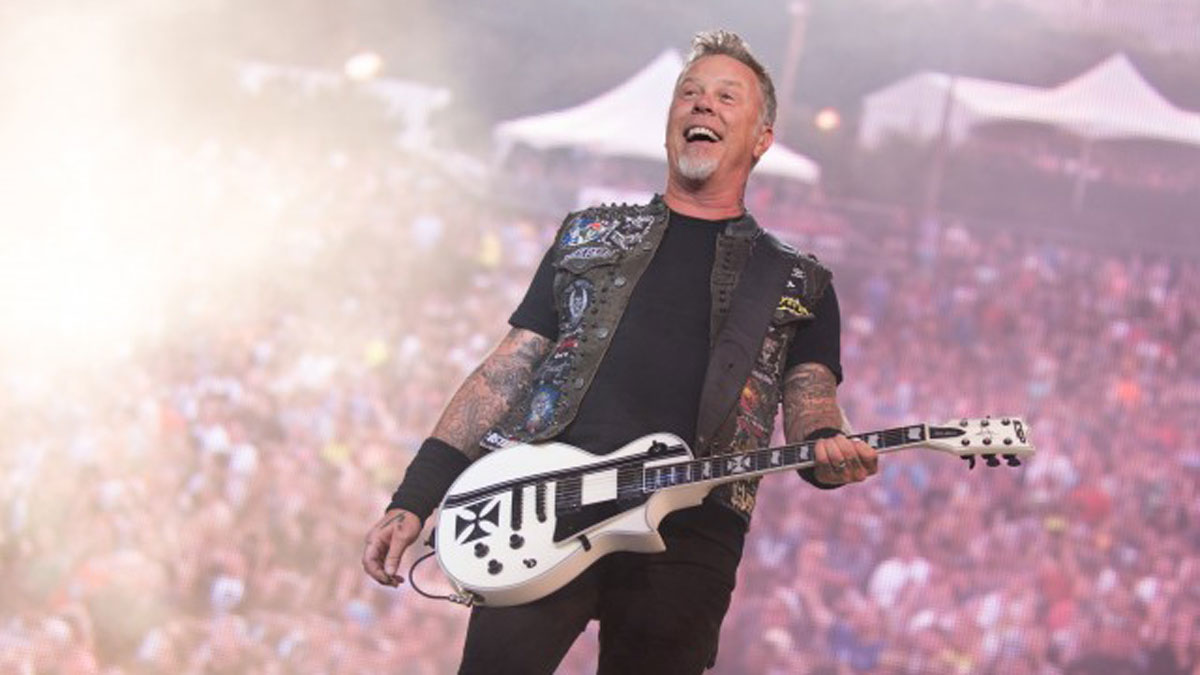
There goes my hero
Fire tells us how it feels to have Metallica legend James Hetfield become a fan of your band...
“I think it was Brian Slagel from Metal Blade who told us James was a fan around the first album. Brian played a big role in our American success, as our first album came out on his label. We were lucky he was up for helping us and, sure as shit, he did.
"We were stood backstage in our underwear and it probably wasn’t the best way to meet your idol for the first time!" - Fire
“Obviously, he’s friends with all these legendary bands, so he started telling me, ‘By the way, these guys like you, those guys like you and... James Hetfield likes you!’ Not long after, Metallica played in Gothenburg - it was one of the Big Four shows and broadcast on national television.
“James wore a Ghost shirt backstage before the show, so the TV host started asking him about us. We were actually on a plane at the time, so when we landed, we switched our phones on and all these messages came in! ‘He’s wearing the shirt!’ Everyone was like, ‘Hey man, forget about the 20 bucks you owe me, I love you!’
“Then James came to see us at our first San Francisco show in this tiny venue, which was more like a coffee shop. We were stood backstage in our underwear and it probably wasn’t the best way to meet your idol for the first time!
“Then he came by after the show, of course, we were in our underwear again. Come to think of it, I’ve met James many times in my underwear! It’s crazy. The guy is like royalty to us.”
Amit has been writing for titles like Total Guitar, MusicRadar and Guitar World for over a decade and counts Richie Kotzen, Guthrie Govan and Jeff Beck among his primary influences. He's interviewed everyone from Ozzy Osbourne and Lemmy to Slash and Jimmy Page, and once even traded solos with a member of Slayer on a track released internationally. As a session guitarist, he's played alongside members of Judas Priest and Uriah Heep in London ensemble Metalworks, as well as handling lead guitars for legends like Glen Matlock (Sex Pistols, The Faces) and Stu Hamm (Steve Vai, Joe Satriani, G3).


